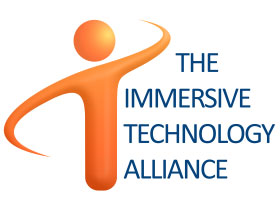The Immersive Technology Alliance Aims To Standardize The Virtual Reality Industry
The Immersive Technology Alliance (ITA) is a not-for-profit corporation created to promote the success of the immersive technology industry.
This is a very broad definition that includes products such as 3D displays, virtual reality HMDs, audio, gesture controls, and anything else that might add an increased feeling of presence to digital media.
Today the group's press release spells out its intent to tackle the lack of standards on the VR front: "The (ITA) is currently forming working groups to make effective quality assurance and software compatibility standards for virtual reality (VR) devices."
There's obviously a lot of potential benefit for standards in this quickly emerging industry. Alan Price, the president of the ITA, said it well: "Less time content makers spend on reinventing the wheel and more time spent on valuable differentiation of their products will accelerate the industry. The more informed debate and varied discussion we can have in the creation of standards the better." In principle, we're inclined to agree. It's hard to imagine someone making a compelling case to the contrary.
Where this could become complicated, though, is when you consider how the biggest players might respond. Until now, Oculus (the maker of the Rift) has been the de facto standard-setting organization for all things VR. It has a lot of clout, and we're not sure it's going to be interested in giving up virtual control of the industry by acknowledging an external standard. Sony is another potential force in VR, but it's less of a factor considering Project Morpheus is a closed platform for the PlayStation console.
Of course, Oculus has yet to release a commercial product regardless of how much mind share it currently owns, and potential competitors are on its heels. Perhaps it's much too early to worry about standardization conflicts in an industry that hasn't even really made it to market yet. No matter how the chips fall, though, it's good to know that the ITA is working toward a non-partisan option. Anything that can potentially help the virtual reality industry make headroom with hardware and software developers is a positive development.
[ADDENDUM January 5th, 2015:]
Neil Schneider, Executive Director of the Immersive Technology Alliance, submitted the following comment regarding our analysis of the potential conflicts that surround an open VR standard:
It's interesting that the discussion of open standards suddenly becomes a question of who it's good for, who has cause to feel threatened, what such and such company will do, etc. This is completely outside the spirit of why standards are being discussed and developed by The ITA's membership.
Get Tom's Hardware's best news and in-depth reviews, straight to your inbox.
Oculus VR, who should be a welcome part of this, has no cause to feel threatened. Thanks to the Facebook acquisition, they already have a valid platform through their audience size, SDKs, and ample resources. Sony is equally welcome, as is everyone else that wants to be a player in this industry.
It's when companies are not working together that there is a looming threat to each others work. For example, if 'product A' provides a horrible VR experience, it reflects on everyone else in the market no matter what level of resources they have at their disposal. There has to be a willingness to share knowledge and agree on some things so that when a product claims to be VR compliant, it has a real meaning to it, everyone is speaking the same language, and it's reflective of an industry position versus a brand's position.
A compatibility standard needs to help fulfill this quality assurance spec, or it could end up in the wrong place. Remember what happened with 3D; they rushed out a standard without thinking through what the entire industry needed, and everyone is still paying for that misjudgment.
Yes, an eventual compatibility standard would go against the grain of expecting to own the entire market, but that's primarily an issue if a company doesn't own a worthy platform. Facebook is a platform, Sony is a platform, Microsoft is a platform, Google is a platform, etc. Each will have to build on their own merits. Standards are for building industries, not brands - and they are a natural progression for any industry that hopes to have a long term future. The ITA wants to see a long term future for this industry and this industry's members.
[/ADDENDUM]
Follow us @tomshardware, on Facebook and on Google+.
Don Woligroski was a former senior hardware editor for Tom's Hardware. He has covered a wide range of PC hardware topics, including CPUs, GPUs, system building, and emerging technologies.
-
Anas Bashar Why do I feel uncomfortably skeptic with this attempt to standardize the VR industry? maybe it will narrow the options for innovation, IDK.Reply
